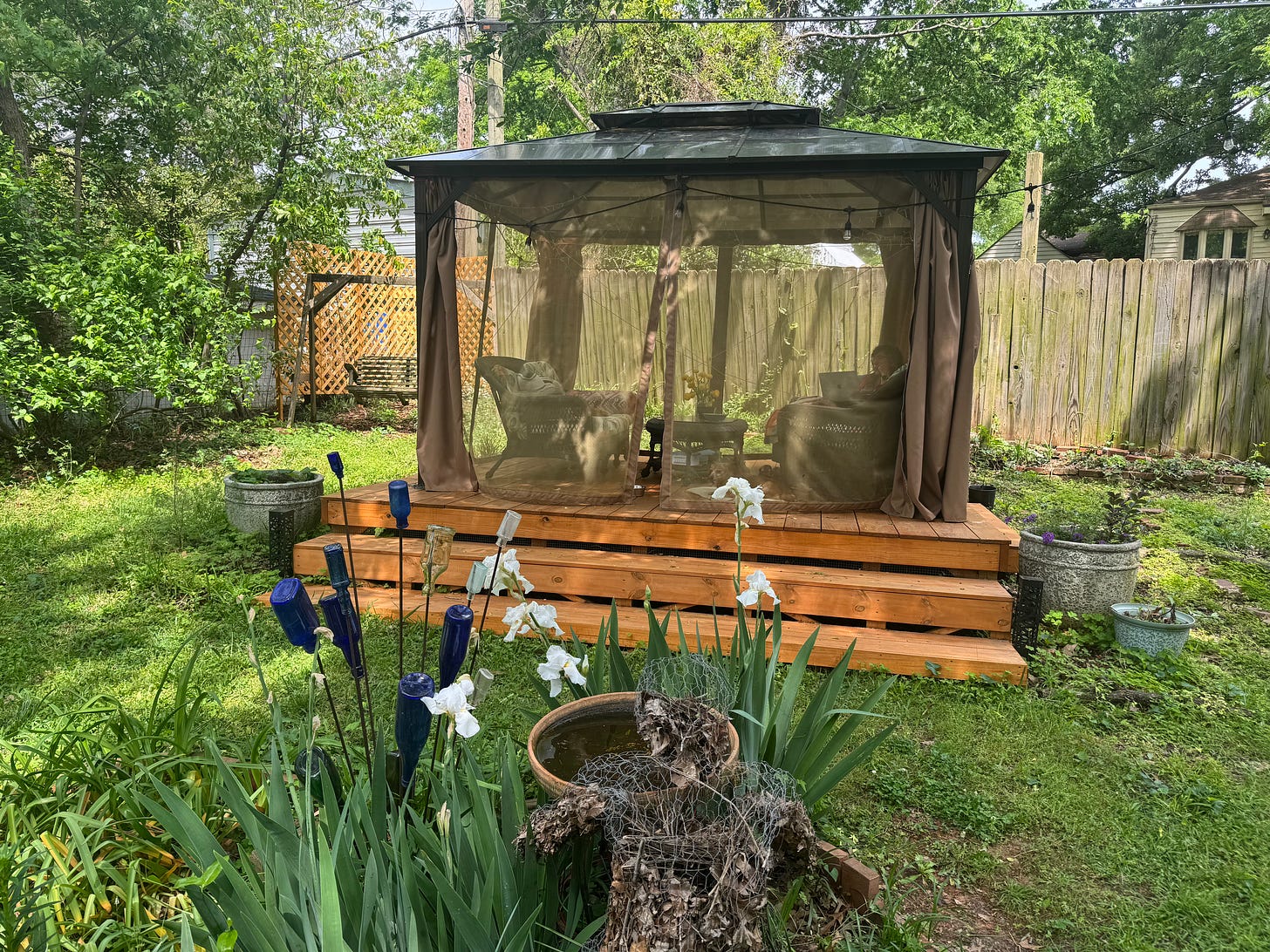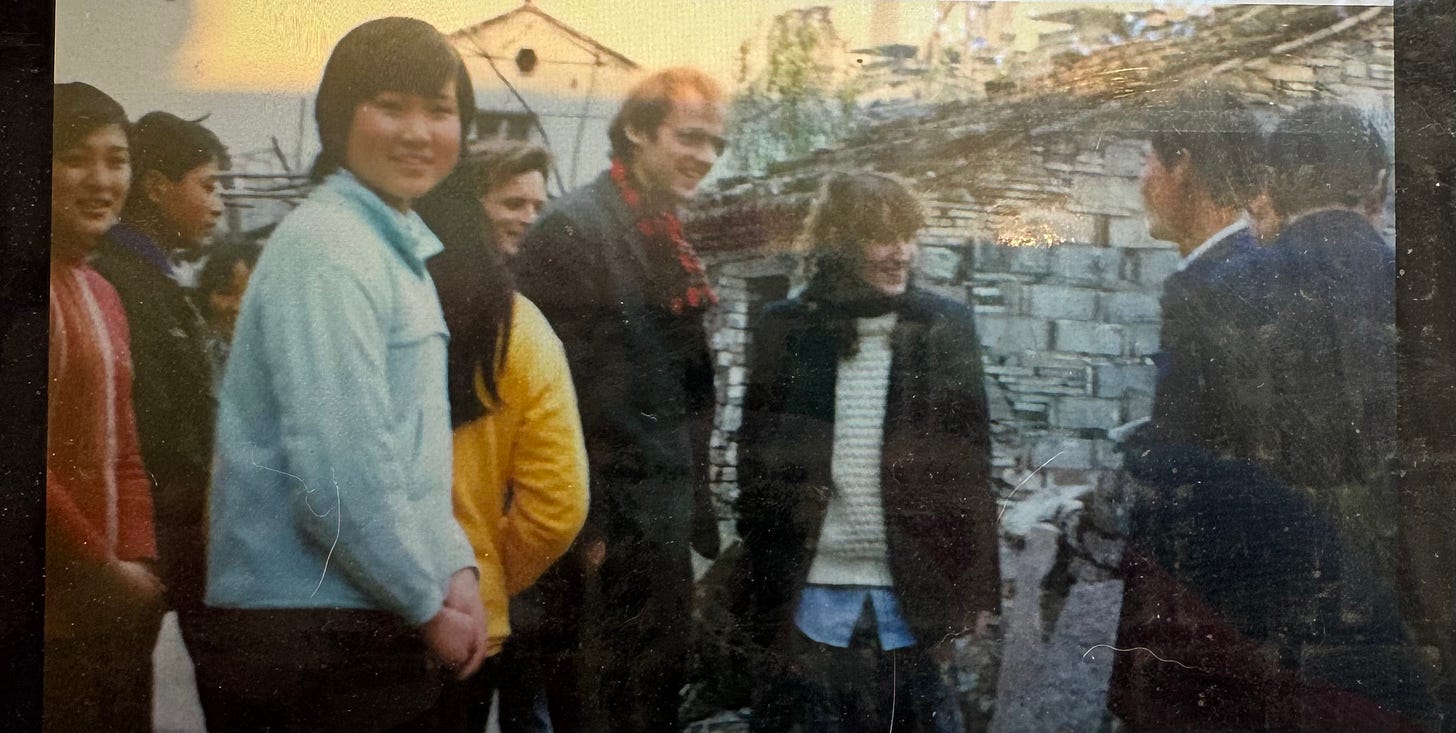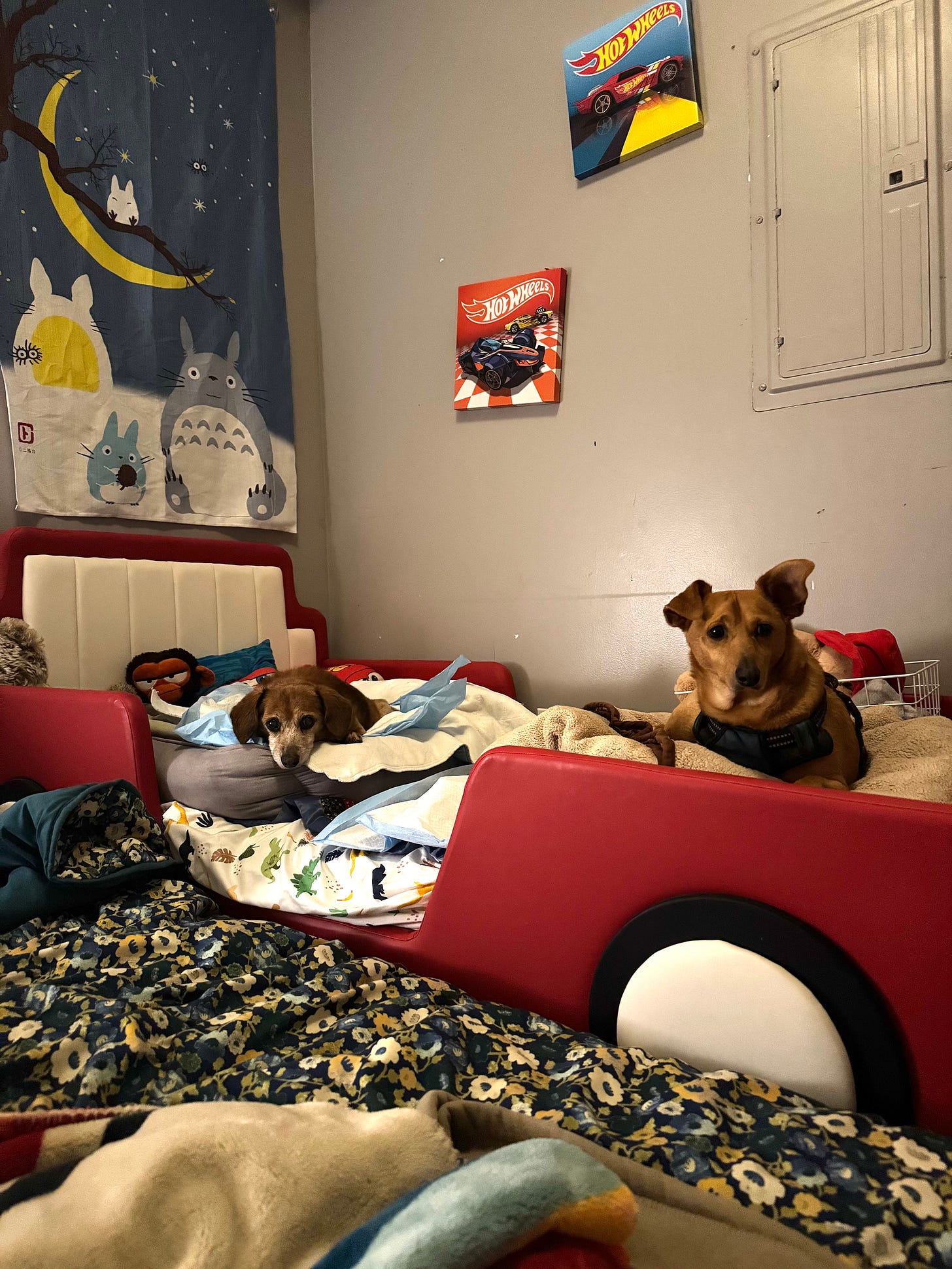It’s well past Easter, careening towards the end of April.
I’ve started this Substack three times or six times?
Revised to the hilt?
My mind, filled to the brim with headlines, to-do lists, and another trip looming after months mostly on the road, assures me this latest Substack offering is no good.
Stop trying.
Enough already.
I haven’t moved much from the perch on the gazebo these past few days. I can hide here from the bug man or the mail carrier or or or…
A friend texted me, “You’re so productive.”
Kind of you to say so, but nope. So, I’ve moved inside to my desk in hopes of finding focus with iced coffee, surrounded by favorite books, pictures, and keepsakes.
Still, a list of to-do items buzzes…
A Few Languishing Substacks unfinished or yet to be written:
My two dear high school teachers who came to my book signing at Union Ave Books in Knoxville. One taught me about John Steinbeck, and another told off a visiting priest in front of the entire student body and snapped us all to attention. I was able to thank them both. (The visiting priest had said to us, “Dating is fine. Go bowling. Go roller skating, but you should never go on a date and do anything you wouldn’t do with your own brother.” We sat there like mice, and this brave teacher, Sharon Husch, stood up to him. I wrote about a version of it in my first novel, Offsides, where I focused on my best friend’s reaction instead of our teacher’s.)
Or the one about Sister Rose, another high school teacher, who accidentally ate a ham sandwich on a Friday during Lent, and the stricken expression on her face when she realized it and told me because I was sitting next to her in what the kids called “The Holy Car” - a black Buick that Father Mankel drove, and that’s a whole other story of riding in the Holy Car to Murfreesboro, Tennessee on a Friday in Lent with three nuns and a priest.
I also haven’t finished the Substack about VOA - Voice of America - a radio broadcast that saved us when we were teaching English in China at Ningbo University and longing for news from the outside world, and now this monstrous administration is attempting to gut it like the gang of middle school bullies it is, riding roughshod over everything.
My insomniac former landlady, who pinched pennies, bemoaned the state of the world, and left typed notes of caution on half scraps of yellowed, ancient typing paper about snaking toilets, and the occasional paper bag of gluey orange jelly candies for the children that Kiffen would say, “You’re not eating that! Throw it away.”
And…and…and…
But the cozy Gazebo couch calls me to close my eyes and sleep, or watch the birds alight on Mama Frances’s birdfeeder, or notice Kiffen plant tomatoes, blueberry bushes, and wildflowers…
And then out of the blue, a long-ago futon floats to mind.
I am reminded of this futon-of-yore because we’ve returned home from a week in Chicago, where we slept on a futon in our grandson Bonnie’s bedroom.
The futon was shoved up against Bonnie’s car bed (where Olive and Wilbur slept), and it reminded me of our early days of marriage and the play that came from spending days and nights on a futon with a new baby.
I wrote “I Am A Futon and Other Umbilical Tales,” and later changed the title to “Blood & Marriage” to capture the days of early motherhood and to slay the inspired character of my late brother-in-law every night in the last act called “Thanksgiving,” whose greeting to me in those brutal days of babies was to ask me, “Wash them dishes yet?” each time he walked through the door (occasionally bearing “pig butt” to roast and to snap at the kids to get away from him, but they only laughed at Uncle Jimmy, not afraid of him.)
He never saw the play where the futon was a major set piece because, as a young mother, I had nightmares that I was a futon and my baby’s head rolled off the futon and across the floor like a softball, and I couldn’t reattach it and what was I going to tell my beloved midwife?
We came home from our son’s birth to our Hollywood studio a few hours after he was born at the Natural Childbirth Institute in Culver City. As was the custom, new moms went home right after the birth, which I knew theoretically was supposed to happen, but I loved my midwife, Nancy McNeese Marchus. I didn’t want to leave her, yet, she needed to live her life and go home and sleep after being up with us all night, with labor starting and stopping, and him being two-and-a-half weeks overdue.
There was a point in heavy labor where I looked at Nancy’s wrist, and she saw the look in my eye, and she said quietly, “Don’t bite me.”
I pulled myself together from the cliff of birth and said, “I won’t. I promise.”
M-O-R-T-I-F-I-E-D.
After Flannery was born a few hours later, I remember driving home with him and sitting in the backseat of our little Toyota Corolla while he breathed soft, shuddering breaths from his car seat, overwhelmed too. I couldn’t believe we were allowed to bring this new baby home on that bright November dusk as the Los Angeles sun was going down.
We knew no one in the city, except our apartment managers, my brother-in-law and his girlfriend, Patty, and her son, Che, and our midwives. We’d only lived in Los Angeles for six months. I adored Patty and Che, who also became characters in “I Am A Futon and Other Umbilical Tales.” Patty was the one who sent me to Dr. Fleiss because baby Che “had yellow eyes like a lion, man. I thought my baby was like a lion with yellow eyes, but instead, he was super-jaundiced and Dr. Fleiss saved him.”
When we got home, I crawled onto the futon with Flannery, or more likely, I crawled onto the futon, and Kiffen handed him to me. I think we got up weeks later, which isn’t true, but the futon took up a ton of space in our studio apartment, so we were on it a lot.
I felt glued to that futon.
I learned to nurse on that futon.
I cried a lot on that futon.
We had cinderblock bookshelves next to the futon, which we later moved after we experienced our first California earthquake, objects in the apartment rattling away like weird clickety-clack wind chimes, and people told us, “It’s the Santa Anas. Santa Ana weather.” What?
When Flannery was a few days old, he had jaundice like baby Che but only a mild case, and his gentle doctor, Dr. Fleiss, whose main advice was, “Nurse, just nurse him,” told me to take off his clothes and let him soak up the California sunshine.
Patty said, “See, I told you. Dr. Fleiss, man. He’s the god. He’s the one.”
Nursing was hard at first, and Nancy, my midwife, gave me similar advice and told me to remove my shirt and awful nursing bra and soak up the California sunshine.
“It toughens up the nipples,” she said matter-of-factly.
It was all too much and so much.
Nursing, jaundice, earthquakes, Santa Anas.
We lived in a studio apartment facing the courtyard in the Valentino Place Apartments, which didn’t get much sun. But then I had an idea to combat the touch of jaundice. While Kiffen went off to his substitute teaching jobs in South Central Los Angeles, I took baby Flannery, and we rode in the ancient birdcage elevator to the rooftop. When the elevator wasn’t working, it was rumored that Rudy Valentino’s ghost was playing with it. It was broken a lot, so we walked up the stairs to the roof. That Valentino Place building felt heavy and haunted, like early motherhood.
But no one was ever on that rooftop - it wasn’t filled with what you might imagine LA rooftops to be with chaise lounges, swirly drinks, and starlets like in the movies. Our Valentine rooftop was made of asphalt and grit, and I’d put baby Flannery down on a towel and a baby blanket, take his clothes off, and lie down next to him. He always stopped crying as the November sun warmed him up. I would look over the Hollywood rooftops, where I would see signs like “Western Costume Supply Company” and "Drink Coca Cola,” or the Hollywood Cinerama Dome from another viewpoint.
But every day for a week, I did as Dr. Fleiss directed, and I took my midwife’s advice, too, and both worked. The jaundice went away, and nursing became easier as we lay together in the California sunshine.
Like I said, we knew no one in Los Angeles in those days.
Except for Dr. Fleiss and Nancy, the midwife, and the other midwives at the Natural Childbirth Institute. And my “wash-them-dishes-yet?” brother-in-law and Patty and Che.
We got to know our apartment managers, one of whom was a makeup artist, and the other did coke, and he’d call me up - confident, friendly, and jittery - to tell me to keep the windows closed during the day, because the baby’s noisy chatter and crying were bugging the other tenants. But they were so nice the first night we brought Flannery home, and they made us plates of pasta with glasses of frozen grape juice.
It was so delicious, and I was so hungry.
How and why do I remember that?
I felt a hundred years old.
I was twenty-six and turning into a futon.
As the months passed and the world kept spinning, I began to fold up the futon during the day to look like the couch, which it was not, to create some semblance of order in that tiny studio apartment.
I also went to Silver Lake Park in search of mothers and writers, and I found them, and they saved me.
I remember I was wearing my son in a baby sling, and I said to one, “This is Flannery. I named him after Flannery O’Connor. We just moved here. We don’t know anyone.”
I almost started crying. I was such a freak.
But I wanted people to know we were a literary family, even if I’d only published articles for my college paper, The Daily Beacon, and had a few one-acts produced in Knoxville and in New York when Tennessee actors held a showcase for a week called “Southern Lights.”
This woman smiled at me and said, “Aw, Flannery. What a great name. Flanman. Nice to meet you. This is Sophie.”
And Terri became my first friend and invited us to our first real dinner party where her husband, George, made curry and served red wine, and she made us decaf coffee with steamed milk after dinner, and I felt like a grownup. Did I know to bring wine and flowers? Did I know anything?
We eventually moved to Silver Lake into a little rental, and we got a bed, a real bed, and we shoved the futon against the wall next to us - a backwards couch turned makeshift crib so Flannery wouldn’t roll out, but he could crawl out to get to us when he woke up in the mornings.
So he never had a crib. He had a futon.
We moved again when I was pregnant with Lucy, and we set up the futon in the TV/guestroom/office. That’s when my parents began visiting and sleeping on the futon. By then, they had moved to San Diego, following us to California when Dad got his last coaching job with the Chargers coaching Special Teams.
On those visits to Silver Lake, my mother used to say to me, “You are the futon generation. I am not the futon generation,” as she would crawl up off the futon and into the kitchen in search of coffee.
When I nursed Flannery, she would say, “You old earth mother, you! In my day, nursing was considered common. But you are of the futon generation.”
My Dad read the sports page and drank his coffee without comment.
And so while in Chicago last week, I thought of my parents sleeping on our futon in Silver Lake since we stayed on a futon in Bonnie’s room next to his car bed. I felt like my mother as I hoisted myself off the floor from the futon each morning, also in search of coffee, and I thought…
It’s happened. I’m no longer of the futon generation. I’ve joined the ranks of the old and the rickety, clawing our way off futons in search of coffee.
This became abundantly clear when I heard Bonnie yelling, “Bop Bop!” - his name for me. “Bop Bop!”
I heard Lucy gently hush him, as our mother hushed us when we woke too early at our grandparents’ home, when our grandmother was sleeping late.
“Shhhhhhhhhh!” Mom would say, “Go back to bed! NOW!”
At eight or nine in the morning on a sunny summer day?
How? Yet somehow, we tiptoed around the house in Leavenworth, Kansas, or played quietly until our grandmother woke up to watch The Young and the Restless, which started at 11:00 Central Time.
Whenever Dad entered a room, our grandmother would say, “Here comes Noise.”
Anyway, it’s like a dream, remembering those years in Hollywood. We didn’t have health insurance and paid the midwives and Dr. Fleiss out of pocket from temp jobs. There was never an emergency, and by the time Flannery was a year old, Kiffen had worked long enough with LAUSD to get us all insurance. Then he was offered a long-term sub position and was invited into the “District Intern Program.”
And a new life began, and I wrote a memory play about it all, fueled by pots of tea and Oreos after the babies went to sleep.
By the time the play changed from “I Am A Futon and Other Umbilical Tales” into “Blood and Marriage,” the babies turned into kids, who jumped on the actors and broke the props or got mad, understandably, when we used their toys as props on stage, and that’s when I thought - maybe I’ll learn to write fiction.
***
Postscript: I’ll be returning to California for the Los Angeles Festival of Books this weekend with my novel, Werewolf Hamlet, a love letter to my children and Los Angeles, and Valentino Place Apartments get a shout-out in the novel.
“Growing Up Is Hard To Do” - Los Angeles Festival of Books
Saturday, April 26th, at the YA Stage with Robin Benway and Hope Larsen.
The coolest 3D book cake ever made of red velvet from the Book Cellar in Chicago and a bakery called The Purple Tulip Cakery in Chicago.












I can't tell you how much I love your memoir writing and essays - and miss you when I do! As you know, I'm living in Manhattan now, but you triggered memories for me - I know the exact view from your roof you described. Suddenly I was back in L.A. And then a long-lost memory. When I was very newly arrived in L.A., over 40 years ago, a friend (with a baby) whom I knew from St. Louis, persuaded me to take a vegetarian cooking class from her doctor's wife at their house, somewhere up around the Greek. Did everybody with a baby go to Dr. Fleiss - and adore him - at that time? His wife was very earth-mother and we just sat in her kitchen and probably talked more than we cooked. I don't have the recipes any more but afterwards we'd sit in the dining room (with the parrot) and eat what we'd made and chat. The classes were on a weeknight and once Dr. Fleiss came in with their kids (5 or so, including you know who; she was still a kid). It was a life so different from my life - I had a good job at Disney but was only starting to make real friends. I haven't thought about that class in many years, so thanks for that. I do still think of my dear friend who brought me to the class - she's long been MIA, lost to mental illness and drugs. I still think about her and the group of people, including me, who did everything we could, but she's been lost to us all for years. Sorry, didn't want to end on a sad note. But that's what happens when you take a stroll down memory lane. Maybe I'll see if I do still have those recipes. Thank you, Kerry!
Futon generation! Yes, I can relate to all this. And Dr Fleiss was our pediatrician too. Miss that old office.